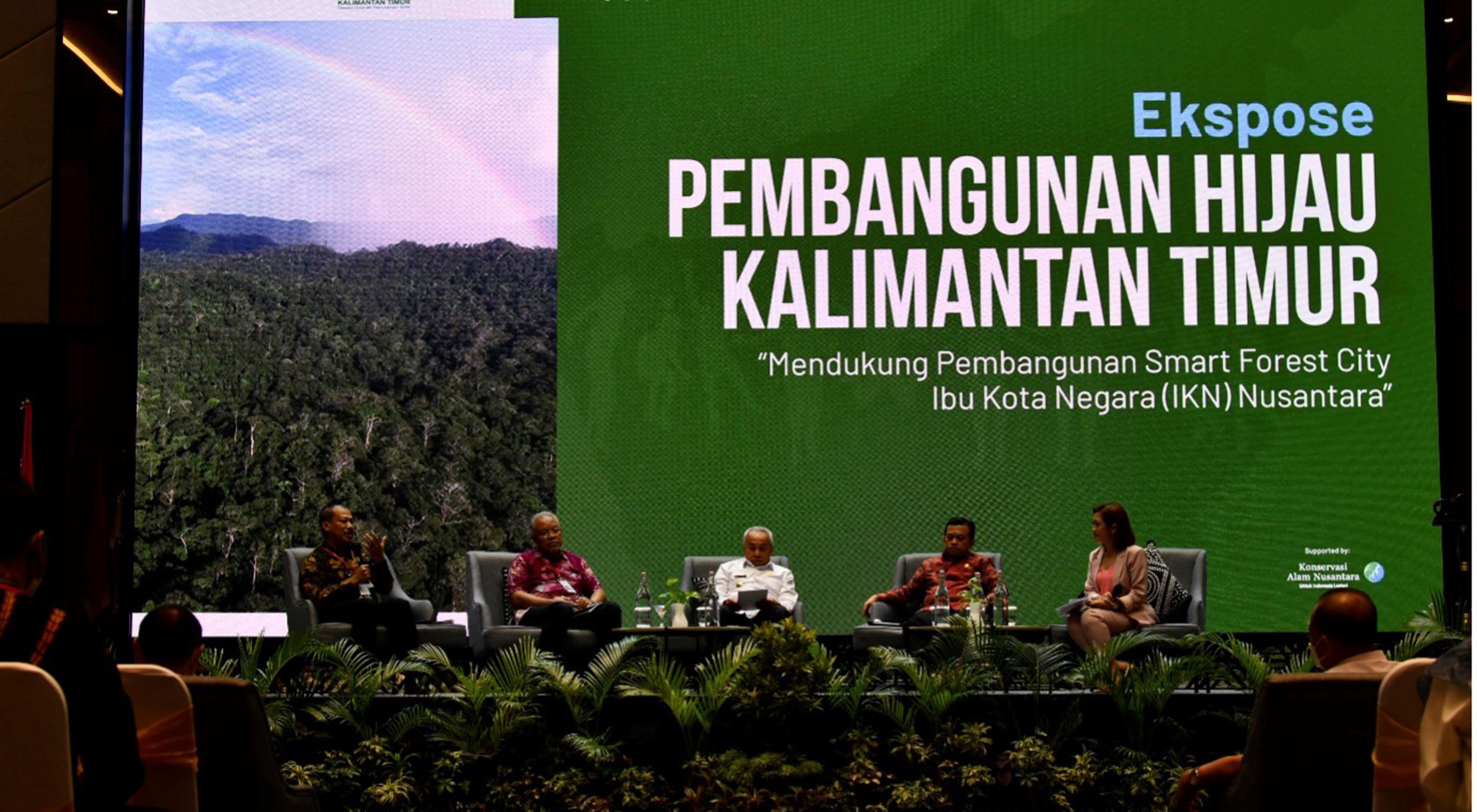The Application of Green Development in East Kalimantan, Encouraging the Realization of “Smart Forest City” in the New Capital City, Nusantara
Media Contacts
-
Maria Adityasari
Communication Specialist YKAN
Yayasan Konservasi Alam Nusantara (YKAN)
Email: maria.adityasari@ykan.or.id
The Central Government has established the infrastructure and development concepts for the new capital city (IKN), Nusantara, in East Kalimantan Timur, with the smart forest city approach. The Ministry of Public Works and Public Housing stated that this development concept would give 50-70 percent proportion to open spaces and buildings, prioritizing water, minerals, and energy efficiencies. This development concept is aligned with the green development efforts in East Kalimantan. “East Kalimantan Province always supports green development policies because green development is a need and the future of developments in Indonesian,” said Isran Noor, Governor of East Kalimantan, in his opening speech at the “Green Development Exhibition: Supporting Smart Forest City Development—New Capital City, Nusantara” event in East Kalimantan on Wednesday, June 8, 2022.
This event is a collaboration between East Kalimantan Provincial Government, East Kalimantan Regional Climate Change Council (DDPI), and Yayasan Konservasi Alam Nusantara (YKAN). This event had two main agenda: a talk show and the green development exhibition. The talk show invited practitioners, experts, and policymakers of green development in East Kalimantan. The exhibition presented various green development achievements and several local products facilitated by YKAN.

Consisting of two discussion sessions, the speakers in the first session were Agus Rusly, Secretary of Directorate General of Climate Change Control, Ministry of Environment and Forestry; Didiet Arief Akhdiat, Head of Spatial Planning Task Force of Infrastructure Developments in the New Capital City (Bidang Pelaksanaan Penataan Kawasan Satuan Tugas Pelaksanaan Pembangunan Infrastruktur IKN); Al Haris, Governor of Jambi; and Dr. Ir. H. Isran Noor, Governor of East Kalimantan. The speakers in the second session consisted of Ir. Hidayanti Darma, Head of Natural Resources and Economy of East Kalimantan Bapedda; Akhmad Wijaya, Director of Yayasan Bioma; Ahmad Nuryawan, Director of Yayasan Mangrove Lestari; Siang Geah, Representative of Wehea Kelay Essential Ecosystem Area Community; Yus Alwi, Daily Chief of Sustainable Plantation Communication Forum; and Prof. Rudianto Amira, Dean of Forestry Faculty at Mulawarman University.
East Kalimantan Provincial Government was making an effort to increase the Gross Domestic Product (GDP) to 80 percent and simultaneously decrease emissions from deforestation and forest degradation. This commitment was then strengthened by Kaltim Hijau (Green East Kalimantan) Declaration in 2010. The Kaltim Hijau is implemented through the economic transformation that gradually decreases its dependence on extractive industry (oil, gas, and coals) and reverting to more renewable natural resources. One of the implementations of this transformation is through the sustainable plantation.
Green Growth Compact (GGC) was established in 2016 to accelerate the implementation of Kaltim Hijau. This program acted as a bridge for collaborative actions at both site and landscape levels based on the collective agreement. East Kalimantan DDPI partnered with several institutions to facilitate communication, coordination, and implementation processes of GGC activities, including the development of prototype initiatives. DDPI is also responsible for establishing cooperation between collaborating parties, formulating a road map and work plan, and monitoring established agreements.
A year after the GGC declaration in 2017, there were seven prototype initiatives. By 2022, there are a total of 11 prototype initiatives that act as climate change mitigation strategies. “Efforts made by East Kalimantan towards green development were collaborative efforts done sustainably,” said Professor Daddy Ruhiyat, Daily Chief of East Kalimantan DDPI. Professor Daddy explained that collaboration is the key to achieving sustainable development. “This compact is voluntary, so we welcome any party interested in joining Kaltim Hijau,” he stated.
These 11 prototype initiatives consist of reducing emissions through Forest Carbon Partnership Facility (FCPF) scheme, achieving the Social Forestry’s goal of 660,782 hectares in East Kalimantan, strengthening the Forest Management Unit (FMU), managing Essential Ecosystem Area (EEA) for orangutan corridor on Wehea-Kelay Landscape, developing Mahakam Delta partnership, Berau Forest Carbon Program (PKHB), developing sustainable agriculture, Climate Village Program, managing land and plantation fire, SIGAP Sejahtera Program, and Adaptation and Mitigation of Climate Change in Balikpapan.
The development of IKN, Nusantara, will align with the implementation of green development that has progressed in Bumi Etam. In his closing note, Ir. Sarwono Kusumaatmadja, Senior Advisor to the Minister of Environment and Forestry, stated, “The relocation of the capital is a logical decision because Jakarta has a problem while East Kalimantan has many potentials such as water reserves, biodiversity, and geographical features that are generally safe.” Sarwono also added that East Kalimantan Provincial Government had practiced green development that aligns with the vision and mission of IKN smart forest city development.
“Today, we provide a space to share lessons learned, create cooperation potential, and invite more parties to be involved in the green development in East Kalimantan,” added Niel Makinuddin, Senior Manager of Terrestrial Program Yayasan Konservasi Alam Nusantara at the event.
The efforts in implementing green development in East Kalimantan hopefully can be a national model because the future of green development in East Kalimantan and Nusantara, the new capital city, will be the face of Indonesia in the future.
Yayasan Konservasi Alam Nusantara (YKAN) is a scientific-based non-profit organization that has been present in Indonesia since 2014. With the mission of protecting lands and waters as life support systems, we provide innovative solutions to realize the harmony of nature and humans through effective natural resource management, prioritizing a non-confrontational approach, and building a network of partnerships with all stakeholders for a sustainable Indonesia. For more information, visit ykan.or.id.


